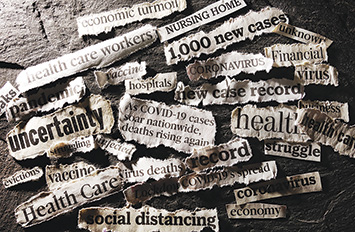 Aside from the obvious physical impacts of the Covid-19 pandemic, health professionals say many people are struggling with the immense emotional and societal changes it has brought. What’s more, they’re finding it hard to adapt to a “new normal” now that lockdowns are starting to ease.
Aside from the obvious physical impacts of the Covid-19 pandemic, health professionals say many people are struggling with the immense emotional and societal changes it has brought. What’s more, they’re finding it hard to adapt to a “new normal” now that lockdowns are starting to ease.
Many psychologists and psychiatrists have reported an influx of people seeking mental health support during the pandemic, with the unprecedented global health crisis causing an increase in anxiety and depression as well as exacerbating existing mental health conditions.
“I have never been as busy in my life and I’ve never seen my colleagues as busy,” Valentine Raiteri, a psychiatrist working in New York, told CNBC. “I can’t refer people to other people because everybody is full.”
One study, published in The Lancet medical journal last October, looked at the global prevalence of depression and anxiety disorders in 204 countries and territories in 2020 due to the Covid pandemic.
It found that mental health dramatically declined in that year, with an estimated 53 million additional cases of major depressive disorders and 76 million additional cases of anxiety disorders seen globally. Women and younger people were found to be affected more than men and older adults.
ANXIETIES
As the pandemic really took hold in the spring of 2020, there was little understanding of how long the pandemic would last. Psychologists say there was a surprising amount of resilience during the first few months of the virus’ outbreak, particularly when many countries went into unprecedented lockdowns.
Over time, however, Raiteri said, the loss of daily social contact started to take its toll.

“There’s definitely a huge mental health impact from a long period of uncertainty and change that’s left people very isolated and not sure how to connect. Just being out in public and interacting in a very casual way with strangers or mild acquaintances, that’s very regulating, and norm-creating and reality affirming.”
When we stop getting those signals, Raiteri said, “our internal voices become stronger and it becomes harder and harder to self-regulate.”
Natalie Bodart, a London-based clinical psychologist and head of The Bodart Practice, said the pandemic meant many people had to confront issues in their life they’d been able to avoid before, such as alcoholism, relationship issues, isolation and loneliness.
“Our day-to-day lives serve as great defense mechanisms, we have lots of distractions that help us to avoid things, for good and for ill,” she said.
WORK AFTER COVID
Employees expect more from their lives and work after Covid, says Harvard’s Gulati
For some people, particularly those with acute social anxiety, Covid lockdowns provided the perfect cover, however.
“For many people, they work really hard, pushing themselves to interact more with other people to socialize more, and Covid just meant that they didn’t have to do that anymore. So they were talking about this huge sense of relief,” said Leigh Jones, a clinical psychologist and the co-founder of Octopus Psychology.
“But although they were kind of delighted when it first happened, then (they were) being really worried about facing people again. And that’s been a kind of across-the-board – people with social anxiety, people with personality disorder, who are avoidant of other people, because it wasn’t so much the isolation that was difficult, it was the getting back out there.”
LOSS OF MILESTONES
To date, there have been over 400 million Covid cases around the world and over 5.7 million deaths, according to data compiled by Johns Hopkins University. Restrictions on social contact have prevented millions of people from sharing not just milestones like births and weddings with family and friends, but also final moments with loved ones, with many unable to hold or attend funerals during the strictest points of lockdown.
Jones noted that she had concerns over the loss of rituals associated with death. “I do really worry about the impact on grieving, because we have rituals for a reason, which is to help us process the loss and the grief,” she said.
TRAUMA
Katherine Preedy, a clinical psychologist based near London, said she is seeing “a lot of trauma, either people who’ve lost people due to Covid” or have experienced other traumatic situations such as not being able to visit sick or dying relatives because of restrictions.
“This is a whole generation. It’s two years of our lives, I think this will have a big impact. There may be first responders, people in hospitals, who are still very much in that survival mode, and then, there’s obviously the emotional impact on people, whole industries being lost, the health impact.”
She noted that mental health professionals are also under pressure to help a greatly increased number of patients.
Bereavement, isolation, uncertainty and loss — a loss of freedoms, relationships and moments that can’t be relived and retrieved — are just some of the issues that have affected people during the pandemic. While the pandemic may be in its “endgame” phase now, psychologists say the mental health impact of Covid could be felt for years.
(A longer version of this story by Holly Ellyatt appeared on CNBC. Read the full story at: cnbc.com/2022/02/10/covid-pandemic-mental-health-damage-could-last-a-generation.html.)


